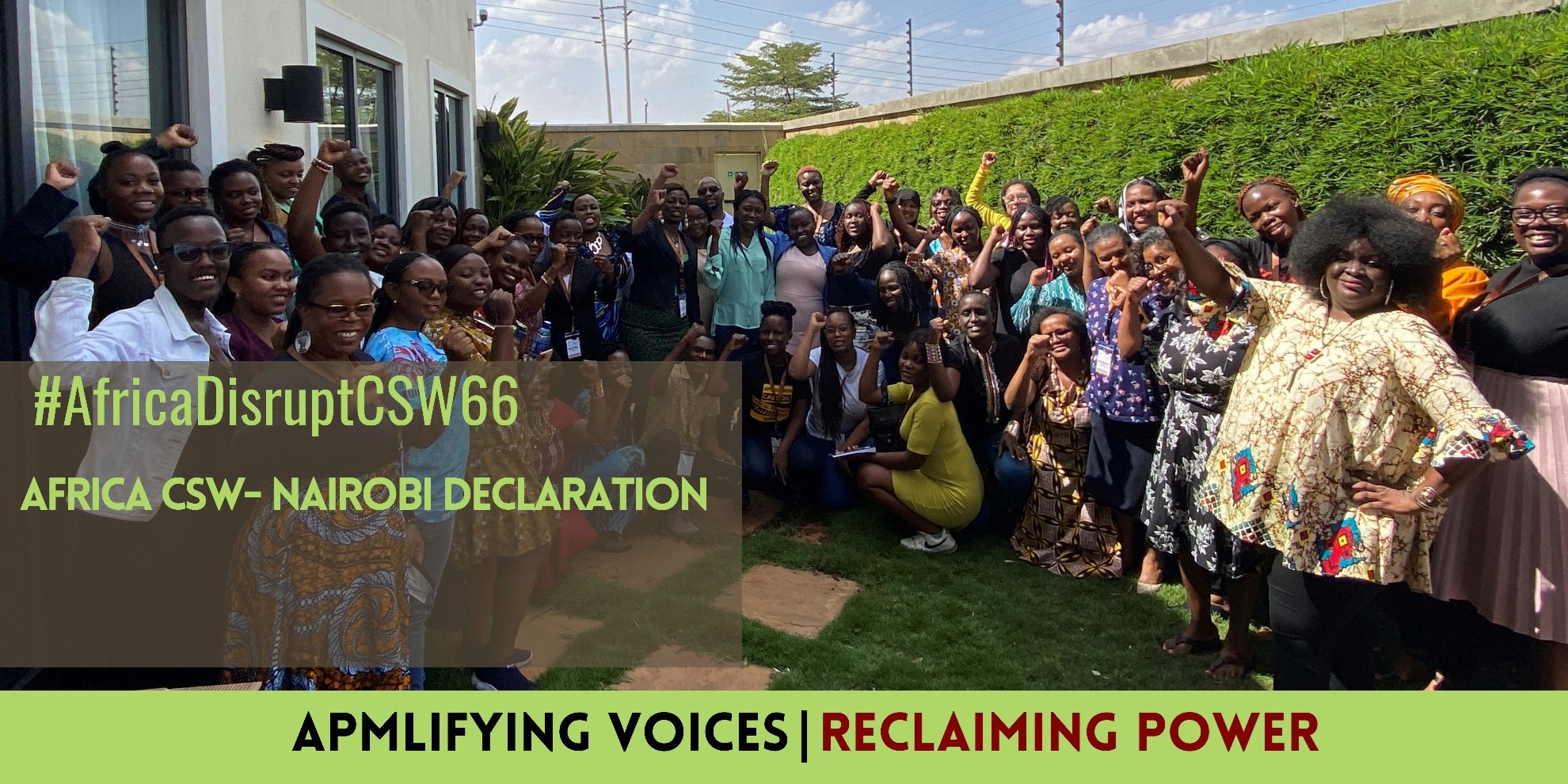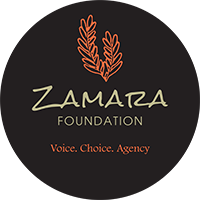
Africa CSW Nairobi Declaration
Africa’s First Commission on Status of Women the sixty-sixth session (Africa CSW66)
Nairobi Declaration, 25th March 2022
African women and girls in all their diversities convened in Nairobi, Kenya, from the 14th to the 17th of March 2022 for the first-ever African Commission on the Status of Women (Africa CSW).
Every year thousands of women and girls in all their diversities gather in New York to participate in the UN Commission on the Status of Women (CSW), the largest global intergovernmental body exclusively dedicated to promoting gender equality and the empowerment of women. The priority theme for this year’s CSW is “Achieving gender equality and the empowerment of all women and girls in the context of climate change, environmental and disaster risk reduction policies and programs”.
Being held in New York every year, African women and girls in all their diversities have not meaningfully engaged or participated in CSW because of factors like visas and high costs related to travel and accommodation. While we acknowledge this global policy-making process as critical to the advancement of gender equality, African women and girls in all their diversities have been left behind.
The Africa CSW was created to respond to the continued shrinking space for feminist and civil society engagement at CSW in New York. Each ECOSOC member can only accredit up to 20 participants for CSW unlike with other UN convenings. The cumbersome accreditation and immigration processes as a result of the racist lens applied in visa processes, COVID-19 regulations, lack of access to vaccinations, expensive accommodation and meals, travel restrictions – economic and otherwise; and the changes informed by the pandemic, in which, country delegations were limited to a maximum of six people by delegation.
Bringing CSW to African women and girls means confronting the increasing invisibilisation of African women, girls, non-binary persons, persons with disabilities, indigenous people, local communities, and the silencing of our minoritized voices at CSW and other global spaces. This is evidenced by the continuous absence of African women’s voices and perspectives in the CSW outcomes and commitments. Instead, we are witnessing INGOs, UN Agencies, governments, privileged voices, and white experts telling our stories, speaking in our names, and taking up our space to convey our lived realities despite open calls for decolonisation, intersectionality, diversity, representation, meaningful engagement and equity. Africa CSW is also meant to demonstrate the possibility of centering the voices and needs of African women and girls in all their diversities looks like!
The Africa CSW presented a first-of-its-kind opportunity for African women, girls, non-binary persons, and persons with disabilities, in all their diversities to congregate, commune, strengthen capacities, and collectively construct their demands for CSW66 as informed by their lived realities, experiences, research, evidence and solutions – to directly inform and influence the 27th United Nations Climate Change Conference (COP 27), future CSW events, and similar global spaces. Africa CSW 66 showcases what it meant to leave no one behind and build better differently.
During the Africa CSW, we noted, with concern, that:
- Girls, women, non-binary, and persons with disabilities experience ecological collapse differently and more severely as they see the persistent dwindling of their resources and the increase of their household and community burden and responsibilities expand. The cuts to public services hit girls and women first and hardest.
- The voices of African women and girls are not heard nor considered on the global stage, when it comes to providing solutions to climate change, yet are in the demographic that is greatly affected by it.
- The twin crisis, the COVID-19 pandemic and the climate crisis has exposed the deep fault lines in gender equality that have intensified the impact of the crisis on girls, women, non-binary, and persons with disabilities as the frequency and intensity of the climate-induced disasters.
- Austerity measures have become the ‘go to’ option for countries in response to crises resulting in cuts in public service budgets resulting in constraints in women’s access to healthcare service, education and other services while at the same time imposing unjust and unreasonable tax burdens on the most vulnerable members of society, in particular women, girls women, girls, non-binary persons, and persons with disabilities.
- Africa’s emissions, both current and cumulative, are negligible, standing at an estimated 3.2% but continues to carry the disproportionate burden of the climate catastrophe due to poor adaptive capacity, high levels of poverty, unsustainable debt burden and other institutional and structural constraints that increase her vulnerability to the negative impacts of the climate crisis. Women and girls across the continent carry the burden of the losses and damages suffered in their communities through their unpaid care and household work. These efforts are largely invisible and unappreciated but increase the existing gender inequalities. African countries, particularly the women and girls who bear the least responsibility for climate change, lack the necessary support. There have been commitments and pledges made but the much-needed resources have not reached women in the frontline of the climate crisis.
- International justice and solidarity is inadequate, and where it exists, it is not framed by African feminist values of shared knowledge, skills, resources, and collective leadership.
We therefore resolve and commit to:
- Convene the Africa CSW annually on the continent, as a collective, bold, brave, intentional, disruptive, and inclusive space for African women, girls, non-binary, and persons with disabilities; and inspire similar movements and invisibilised voices from the Middle East and North Africa, Latin America, the Caribbean, and Asia, to do the same in, and for, their regions.
- Center the decolonisation agenda in our climate justice, gender equality and social justice struggle, recognising that the legacies of colonialism and its racist and sexist ideologies, and current efforts of neo-colonialism as promulgated through trade, aid, and by international financial institutions are at the heart of the problem.
- Continue to advance intersectional approaches in our social, economic and political struggle for the full liberation of women, recognising that African women, girls, non-binary persons, persons with disabilities do not live single issue lives.
- Take up our space as African women, girls, non-binary persons, persons with disabilities on the continent and in the diaspora in global and regional fora to tell our stories, experiences, research, indigenous and technical knowledge and ensure that decisions taken reflect and draw inspiration from our realities.
- Foster collaborations of national, regional, and global leaders from feminist networks, civil society, international development, and the private sector to directly inform and influence the 27th United Nations Climate Change Conference (COP 27), future CSW events, and similar global spaces.
- Advocate for the UN Economic and Social Council and CSW to adopt a similar approach – rotating the venue for CSW to facilitate and encourage meaningful participation and access for invisibilized voices from Africa and the Global South.
- Center the necessary contributions and leadership of African young women, girls, non-binary and persons with disabilities youth in all their diversities.
- Continue to dream and re-imagine as a political and feminist tool in response to the climate crisis, including boldly challenging systems and structures of oppression such as patriarchy, capitalism, neo-colonialism, neoliberalism, imperialism and all other isms that seek to advance false solutions to solving the climate crisis.
- Value, center, and leverage the data, stories, contributions, technical expertise and knowledge systems of generations of African women, girls, non-binary, and persons with disabilities in research, advocacy, and policy.
- Recognize that African solutions to climate change should be taken into account into the global fight against climate change.
- Advocate for the social transformation that is much needed for gender justice and generation equality.
- Recognize that the realization of gender equality, climate justice, and social and economic transformation must be funded and that this requires human rights and gender-responsive budgets, progressive taxation and strong investment in public services and public (especially towards the redistribution of care) infrastructure.
- Accept that African women, girls, non-binary persons, and persons with disabilities are disproportionately affected by climate change and this coupled with the current economic injustice and other intertwined gender issues make it hard to thrive and live dignified lives. We, therefore, hope to see the conversation around climate change and action at the CSW being led by women, girls, non-binary persons, and persons with disabilities and deliberate action to centre these invisibilized voices in the face of this crisis.
- Demand accountability from national governments in the capitals and permanent missions pre, during and post CSW.
